Civil Rights Groups Delay Release of “Framework for Education Reform” Critical of Obama and Duncan Education Policies... Release delayed due to 'scheduling conflicts'?
Seven civil rights groups have written a “Framework for Education Reform” that while not a trouncing of the Obama and Duncan education agenda definitely is critical of it and offers up a remedy for the nation’s education ills. That document was supposed to be released on July 26, 2010, but the press conference scheduled was cancelled. A spokesperson quoted in the Washington Post said it was due to scheduling conflicts by leaders of the groups.
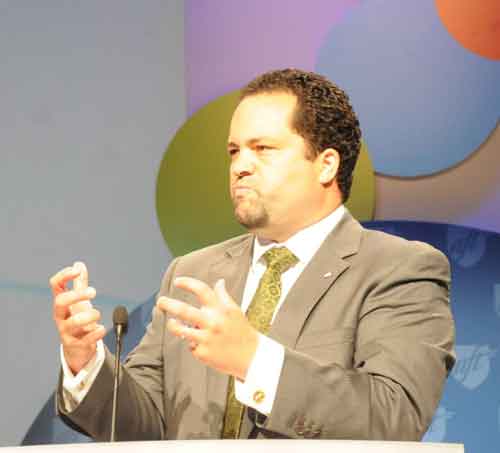 NAACP chief Benjamin Jealous (above speaking to the American Federation of Teachers convention on July 9, 2010) was one of the civil rights leaders who joined in the critique of Race To The Top. Substance photo by George N. Schmidt.The delay was being questioned however since there were to be public appearances the same week by President Obama and Education Secretary Arne Duncan at the National Urban League convention in Washington D.C.
NAACP chief Benjamin Jealous (above speaking to the American Federation of Teachers convention on July 9, 2010) was one of the civil rights leaders who joined in the critique of Race To The Top. Substance photo by George N. Schmidt.The delay was being questioned however since there were to be public appearances the same week by President Obama and Education Secretary Arne Duncan at the National Urban League convention in Washington D.C.
President Obama was making his speech on Thursday; Secretary Duncan was scheduled for Wednesday. The Urban League is one of the groups authoring the framework.
An inquiry phone call to the National Urban League was forwarded to its press office but the call went unanswered. Parents United for Responsible Education is reporting on its website that those groups “were instead meeting with Fed Head Arne Duncan.”
http://pureparents.org/index.php?blog/show/Education_civil_rights_showdown_in_DC
Joining the Urban League in this endeavor are The Lawyers Committee for Civil Rights Under Law, the National Action Network (headed by the Reverend Al Sharpton), The National Association for the Advancement of Colored People (NAACP), NAACP Legal Defense and Educational Fund Inc., National Council for Educating Black Children, The Rainbow PUSH Coalition, and The Schott Foundation for Public Education.
The 17-page framework starts out with their reason for coming up with it and acknowledging and commending the current administration’s goal for the U.S. “to become a global leader in post-secondary education attainment by 2020 and its efforts to develop specific strategies for turning around low-performing schools.” It goes on to say, however, “that more comprehensive reforms are necessary to build a future where equitable educational opportunity is the rule, not the exception.” The framework then outlines six major principles that the groups will “collectively advocate to strengthen the Elementary and Secondary Education Act (ESEA) and ensure that the federal government provides the support necessary to protect every child’s civil right to a high-quality education”:
1. Equitable Opportunities for all;
2. Utilization of systematically proven and effective educational methods;
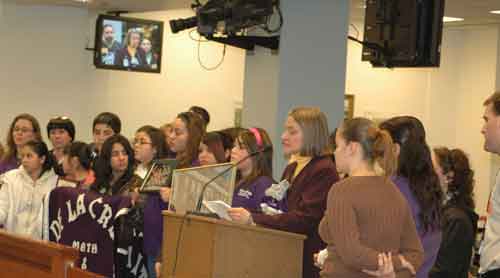 When Arne Duncan proposed the closing of the highly successful De La Cruz middle school in February 2008, the majority of teachers, parents, and students appeared at the hearing, delaying the closing for one year. As soon as the school was actually closed in June 2009, the Board of Education quickly gave the recently repaired building to the UNO charter schools at an annual rental of $1. Above, the De La Cruz teachers, parents, and students gather around the schools banner at the February 2008 hearing while the school's principal, Katherine Konopasak, outlines the successes of the school. Substance photo by George N. Schmidt.3. Public and community engagement in education reforms;
When Arne Duncan proposed the closing of the highly successful De La Cruz middle school in February 2008, the majority of teachers, parents, and students appeared at the hearing, delaying the closing for one year. As soon as the school was actually closed in June 2009, the Board of Education quickly gave the recently repaired building to the UNO charter schools at an annual rental of $1. Above, the De La Cruz teachers, parents, and students gather around the schools banner at the February 2008 hearing while the school's principal, Katherine Konopasak, outlines the successes of the school. Substance photo by George N. Schmidt.3. Public and community engagement in education reforms;
4. Safe and educationally sound learning environments;
5. Diverse learning environments; and
6. Comprehensive and substantive accountability systems to maintain equitable opportunities and high outcomes.
In the frameworks recommendations the groups call for “shifting the focus from competitive grants for a few states to incentives for all states to embrace systemic reform.” It says that if education is a civil right, children in “winning states” should not be the only ones who have the opportunity to learn in high-quality environments. The groups back up their recommendation with numbers related to Race to the Top’s implementation. Only 15 states and the District of Columbia were on the shortlist to be eligible. In the finalist states only 37% are eligible for free and reduced lunch, only 14% are Hispanic, only 53% of black students in the U.S. are in the finalist states and overall 42% or 12.5 million children would not be covered. The framework says:
“The Race to the Top Fund and similar strategies for awarding federal education funding will ultimately leave states competing with states, parents competing with parents, and students competing with other students..... By emphasizing competitive incentives in this economic climate, the majority of low-income and minority students will be left behind and, as a result, the United States will be left behind as a global leader.”
The framework is also critical of the way communities of color have been used in the name of educational change. It says:
“For far too long, communities of color have been testing grounds for unproven methods of educational change while all levels of government have resisted the tough decisions required to expand access to effective educational methods. The federal government currently requires school districts to use evidence-based approaches to receive federal funds in DOE’s Investing in Innovation grant process. So, too, in all reforms impacting low-income and high-minority communities, federal and state governments should meet the same evidence-based requirement as they prescribe specific approaches to school reform and distribute billions of dollars to implement them.
“Rather than addressing inequitable access to research-proven methodologies like high-quality early childhood education and a stable supply of experienced, highly effective teachers, recent education reform proposals have favored “stop gap” quick fixes that may look new on the surface but offer no real long-term strategy for effective systemic change. The absence of these “stop gap” programs in affluent communities speaks to the marginal nature of this approach. We therefore urge an end to the federal push to encourage states to adopt federally prescribed methodologies that have little or no evidentiary support – for primary implementation only in low-income and high-minority communities.”
Thank you.
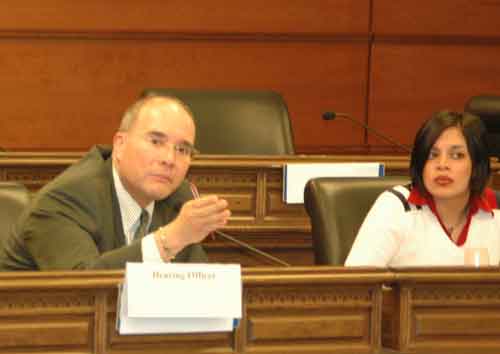 Although the Chicago Plan claimed that each school would get a "hearing" under the control of an attorney who claimed to be an "independent" hearing officer, Chicago researchers (from Substance) discovered in 2007 that the majority of the hearing officers came from outside law firms with lucrative contracts to represent Chicago's public schools and other city agencies. Above, hearing officer Respicio Vazquez was threatening to remove elementary school teacher Norine Gutekanst from the February 2008 hearing on the closing of De La Cruz middle school after Gutekanst demanded that the hearing provide adequate translation time for parents and students whose first language was Spanish. Vazquez was a partner in the law firm of Franzek Sullivan, which annually received hundreds of thousands of dollars for doing legal work for Chicago's Board of Education. Substance photo by George N. Schmidt.That is something that educators have been calling for, for years. In Chicago, we have been subjected to scripted curriculum and standardized test prep while we avoid research proven methods such as lower class size and the above mentioned high-quality early childhood education.
Although the Chicago Plan claimed that each school would get a "hearing" under the control of an attorney who claimed to be an "independent" hearing officer, Chicago researchers (from Substance) discovered in 2007 that the majority of the hearing officers came from outside law firms with lucrative contracts to represent Chicago's public schools and other city agencies. Above, hearing officer Respicio Vazquez was threatening to remove elementary school teacher Norine Gutekanst from the February 2008 hearing on the closing of De La Cruz middle school after Gutekanst demanded that the hearing provide adequate translation time for parents and students whose first language was Spanish. Vazquez was a partner in the law firm of Franzek Sullivan, which annually received hundreds of thousands of dollars for doing legal work for Chicago's Board of Education. Substance photo by George N. Schmidt.That is something that educators have been calling for, for years. In Chicago, we have been subjected to scripted curriculum and standardized test prep while we avoid research proven methods such as lower class size and the above mentioned high-quality early childhood education.
The framework also addresses the subject of neighborhood/community schools and turn around policy in two of their recommendations. The first “Promote and Support the Transformation of Low-Performing Schools into Community Opportunity Education Networks.” The framework states:
“We know that good communities create the foundation for great schools. Public schools, as the only mandatory community institutions, can serve as brokers for success, connecting students and parents with supports and resources. In transforming public schools into the hubs of their communities, teachers and principals should play lead roles, supported by mentors, counselors, and health providers.”
Seems to me I have heard educators also calling for that for years now. I believe I have heard newly elected Chicago Teachers Union President Karen Lewis call for these services and resources in our Chicago Public Schools.
In the other recommendation, “Employ School Closure Only as a Last Resort and with Appropriate Safeguards”, the groups take a shot at turnaround policy. The groups feel the Obama administration places too much emphasis on school closure and the reconstitution of school staff. They cite research on Ren 2010 from the Chicago Consortium on School Research that says these strategies have increased disruption and have not improved achievement. The research also discusses how some schools created in their place do not admit or retain the most “educationally needy” students. It goes on to say:
“Because public schools are critical community institutions especially in urban and rural areas, they should be closed only as a measure of last resort. And where a school district deems school closure necessary solely for budgetary or population reasons, the burdens cannot be allowed to fall disproportionately on our most vulnerable communities. We must ensure safeguards are in place to prevent the inequitable distribution of local school closings in low-income and high minority communities.”
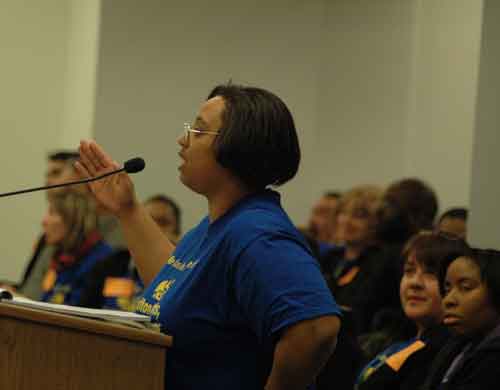 Above, Fulton elementary school teacher Brandi Martin was one of hundreds of African American teachers, parents and children who opposed the "turnaround" policies of Arne Duncan. The schools that were subjected to so-called "turnaround" between 2005 and 2010 in Chicago all served poor inner city children, most of whose teachers were African American. Substance photo by George N. Schmidt.The framework urges the administration to not allow the turnaround model “without ensuring a process for input from, and collaboration with parents, the community, and teachers.” It also recommends that before turnaround is adopted” a school district should be required to employ a proven, effective community-based turnaround with sufficient time and support for that model to bear fruit under normal implementation conditions.” I have been hearing this in Chicago since the turnaround began about six years ago. Secretary Duncan didn’t listen then as the CEO of the Chicago Public Schools. Let’s hope these civil rights groups providing this framework “get his ear.”
Above, Fulton elementary school teacher Brandi Martin was one of hundreds of African American teachers, parents and children who opposed the "turnaround" policies of Arne Duncan. The schools that were subjected to so-called "turnaround" between 2005 and 2010 in Chicago all served poor inner city children, most of whose teachers were African American. Substance photo by George N. Schmidt.The framework urges the administration to not allow the turnaround model “without ensuring a process for input from, and collaboration with parents, the community, and teachers.” It also recommends that before turnaround is adopted” a school district should be required to employ a proven, effective community-based turnaround with sufficient time and support for that model to bear fruit under normal implementation conditions.” I have been hearing this in Chicago since the turnaround began about six years ago. Secretary Duncan didn’t listen then as the CEO of the Chicago Public Schools. Let’s hope these civil rights groups providing this framework “get his ear.”
The groups also take on charter school expansion. They say they have reservations about the “extensive reliance on charter schools.” They are concerned about the overrepresentation of charter schools in low-income and communities of color. The framework cites more research that says:
“There is no evidence that charter operators are systematically more effective in creating higher student outcomes nationwide. The largest national study found that charters are more likely to underperform than outperform other public schools serving similar students.”
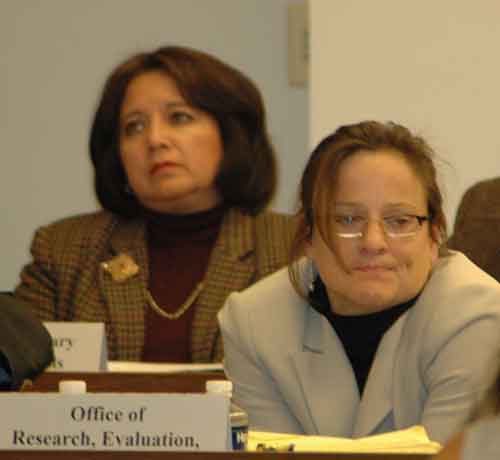 During the five years in Chicago that Arne Duncan presided over the attacks on public schools in the inner city under the guise of "turnaround" and other strategies now being exported under 'Race to the Top', the Chicago Board of Education had three different administrators in charge of preparing the statistics and data sets used to claim that the schools had failed. After she did the Board's work against inner city schools for three years, Dr. Ginger Reynolds (above, at the hearing against the all-black Fulton Elementary School in February 2008) was fired by Duncan's replacement, former Chicago police officer Ron Huberman, who is currently serving as CPS CEO. Huberman replaced Reynolds with a person named Sara Kremsner, who had not background in education nor training in her field. Kremsner currently oversees Chicago's "Performance Management Office," the latest title Chicago has given to what was once called "Research and Evaluation." Substance photo by George N. Schmidt.It also questions whether charters serve the same population as neighborhood/community schools do. They also call for safeguards to ensure charter schools don’t promote “gentrification through disproportionate exclusion” of students that need quality schools the most. Again, nothing knew if you are an educator, especially one in Chicago.
During the five years in Chicago that Arne Duncan presided over the attacks on public schools in the inner city under the guise of "turnaround" and other strategies now being exported under 'Race to the Top', the Chicago Board of Education had three different administrators in charge of preparing the statistics and data sets used to claim that the schools had failed. After she did the Board's work against inner city schools for three years, Dr. Ginger Reynolds (above, at the hearing against the all-black Fulton Elementary School in February 2008) was fired by Duncan's replacement, former Chicago police officer Ron Huberman, who is currently serving as CPS CEO. Huberman replaced Reynolds with a person named Sara Kremsner, who had not background in education nor training in her field. Kremsner currently oversees Chicago's "Performance Management Office," the latest title Chicago has given to what was once called "Research and Evaluation." Substance photo by George N. Schmidt.It also questions whether charters serve the same population as neighborhood/community schools do. They also call for safeguards to ensure charter schools don’t promote “gentrification through disproportionate exclusion” of students that need quality schools the most. Again, nothing knew if you are an educator, especially one in Chicago.
The framework calls for public, community and parental involvement in educational reform and says the Obama administration makes “only cursory mention of parent and community engagement in local school development.” It also calls for the administration to “Promote and Support Alternatives to Exclusionary Discipline Policies.” It also asks for federal funding for school climate improvement. The framework ends by calling for its adoption and the convening of a summit and panel consisting of all stakeholders.
While this framework makes a lot of good points and I commend the groups for their action I feel it comes way too late. The Duncan education policies which have now become the Obama education policies are nothing new to educators, community groups, parents and students in Chicago. We have been fighting these policies in Chicago for a long time. It’s a shame that these groups didn’t listen to us before Arne went national. Perhaps, this all could have been avoided. As I stated earlier Duncan did not listen to us when he was CEO of CPS. The question now becomes will President Obama and Secretary Duncan listen to you. We can only hope. 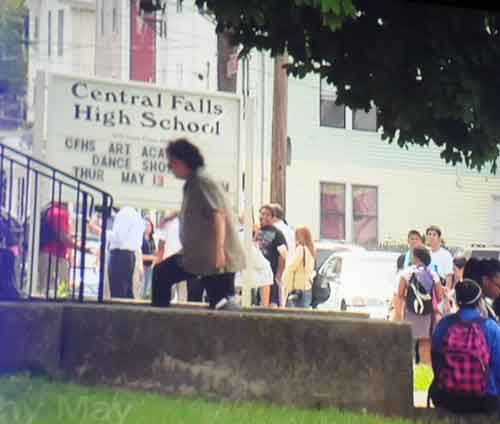 National attention to the closing of public schools for "failure" as measured by standardized test scores (regardless of the challenges faced by students in backgrounds of poverty) ignored the closing of dozens of Chicago schools — all of them all-black or serving minority populations and staffed by mostly minority teachers — from 2005 through 2010. Yet the proposed "turnaround" of Central Falls Rhode Island High School in 2010 generated a national outcry and outrage that many in Chicago considered racist. To this date, no one at the American Federation of Teachers (AFT) has devoted any energy to documenting the vicious attacks on Chicago's inner city schools and teachers during the years of Mayor Daley's "Renaissance 2010" program, which was administered by Arne Duncan until he became U.S. Secretary of Education in January 2009. Photo courtesy American Federation of Teachers.
National attention to the closing of public schools for "failure" as measured by standardized test scores (regardless of the challenges faced by students in backgrounds of poverty) ignored the closing of dozens of Chicago schools — all of them all-black or serving minority populations and staffed by mostly minority teachers — from 2005 through 2010. Yet the proposed "turnaround" of Central Falls Rhode Island High School in 2010 generated a national outcry and outrage that many in Chicago considered racist. To this date, no one at the American Federation of Teachers (AFT) has devoted any energy to documenting the vicious attacks on Chicago's inner city schools and teachers during the years of Mayor Daley's "Renaissance 2010" program, which was administered by Arne Duncan until he became U.S. Secretary of Education in January 2009. Photo courtesy American Federation of Teachers.
The framework can be found at the following web address.
https://docs.google.com/fileview?id=0B36JWPh1Vfr7OTc3ZWI0N DctODVlMC00N2I2 LWExNmItZmIyZGEzY2E5Y zlm&hl=en&authkey=CNG2pP4E


By: Jeremy Kemp
It's Hopeless
Nobama takes Duncan to Washington to fix the nation's schools? What a joke. The nation needs to come to Chicago to fix corrupt charter schools like Galapagos and UNO.
We need to face facts. We are heading for a new dark age because no one will face the truth about why education has stopped working in Chicago, California, North Carolina, Florida and especially Texas.
It's not the teachers, the unions, or all the other bogey-men the politicians invent. It is the politicians who think they can have their cake (import Democrat votes) and eat it too (have an effective school system).
Close the gates and in 20 years it will start working. Keep the gates open and cry amnesty, and the problem gets worse.
It's so simple, even a cave man can figure it out.